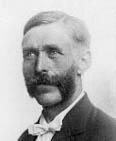 In my previous post in this current series on my immigrant ancestors, I mentioned the Swier family, who adopted my grandfather, David Swier. My grandfather’s adopted parents, Walter Swier and Laura Helen Schmidt Swier, were both the children of immigrants.
In my previous post in this current series on my immigrant ancestors, I mentioned the Swier family, who adopted my grandfather, David Swier. My grandfather’s adopted parents, Walter Swier and Laura Helen Schmidt Swier, were both the children of immigrants.
Dirk Swier (left) was born in Bovenkarspel in the province of Noord-Holland in the Netherlands on December 6, 1855. He married Aaltje Zwier on May 1, 1879. Dirk was diagnosed with a lung condition and was advised to move to a warmer, drier climate, so he decided to 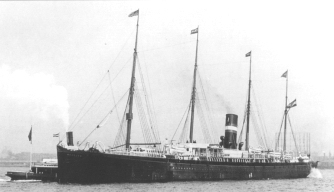 move his family to America. The Swiers traveled to America on the Maasdam (Wikipedia article), arriving March 9, 1893. The family first moved to Red Lion, Colorado. Red Lion is located in Logan County, in the northern part of the state, near the Nebraska border. Dirk worked for the Holland Dutch Seed Company and became a U.S. citizen while living in Colorado. According to an account written by Dirk’s son Walter, the Swiers were taken in by a fradulent land deal and were forced to move to Iowa in the winter of 1893. The Swiers remained in Iowa for seven or eight years and then decided to move west to Washington State with a group of Dutch immigrants. They settled in the Moxee Valley in Yakima County in 1901. They cleared the land, built a house and barn, and grew vegetables and raised dairy cattle. Dirk traveled six miles in a horse-drawn buggy several times a week in order to sell vegetables in Yakima stores. He also raised hogs and chickens. His health improved while living in Moxee. Dirk and the other Dutch settlers decided to build a Dutch church, and they established the First Reformed Church. The Swiers prayed and read the Bible before meals. On Sundays, they attended English services in the morning and Dutch services in the evening. They opened their home to visitors on Sunday afternoons. They were particularly helpful to new settlers, allowing the newcomers to stay in their home until they could construct their own homes. They also opened their home to visiting preachers.
move his family to America. The Swiers traveled to America on the Maasdam (Wikipedia article), arriving March 9, 1893. The family first moved to Red Lion, Colorado. Red Lion is located in Logan County, in the northern part of the state, near the Nebraska border. Dirk worked for the Holland Dutch Seed Company and became a U.S. citizen while living in Colorado. According to an account written by Dirk’s son Walter, the Swiers were taken in by a fradulent land deal and were forced to move to Iowa in the winter of 1893. The Swiers remained in Iowa for seven or eight years and then decided to move west to Washington State with a group of Dutch immigrants. They settled in the Moxee Valley in Yakima County in 1901. They cleared the land, built a house and barn, and grew vegetables and raised dairy cattle. Dirk traveled six miles in a horse-drawn buggy several times a week in order to sell vegetables in Yakima stores. He also raised hogs and chickens. His health improved while living in Moxee. Dirk and the other Dutch settlers decided to build a Dutch church, and they established the First Reformed Church. The Swiers prayed and read the Bible before meals. On Sundays, they attended English services in the morning and Dutch services in the evening. They opened their home to visitors on Sunday afternoons. They were particularly helpful to new settlers, allowing the newcomers to stay in their home until they could construct their own homes. They also opened their home to visiting preachers.
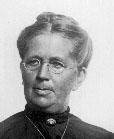 Aaljte Zwier (left) was born in Enkhuizen, Noord-Holland on May 10, 1858. Both Dirk and Aaltje descend from Hendrik Swier; they were second cousins once removed. However, Aaltje’s grandfather, Klaas Zwier, adopted an alternate spelling of the name, whereas Dirk’s great-grandfather Wouter (Klaas’s brother) kept the spelling Hendrik used. By the time she came to America with her husband Dirk, Aaltje had seven daughters: Diewertje, Trijntje, Antje, Cornelia, Gerritje, Aafje and Aaltje. One of their daugthers, Aaltje, died before the family emigrated to America. Once the family moved to America, they Anglicized their names. Dirk was sometimes referred to as “Dick.” Aaltje herself became “Alice.” Their six daughters became Dora (Diewertje), Kate (Trijntje), Anna (Antje), Cora (Cornelia), Gertrude (Gerritje), and Effie (Aafje). Aaltje, or Alice, as she was then known, gave birth to six more children in America: Walter, Alice, Rena, Cobie (or Bertha), Richard, and Gerrit Benjamin. Once the family relocated to Yakima, Aaltje wrote a devotional column called De Volksvriend (The Peoples’ Friend) for the National Dutch weekly paper. She always kept peppermints and sugar cookies in her pantry, which she served at daily coffees she scheduled at 9:30 A.M. and 3:30 P.M. It is said that she was constantly in prayer, even as she darned socks while rocking in her rocking chair. As her children or grandchildren departed from her home, she always left them with this advice: “Never forget to pray.”
Aaljte Zwier (left) was born in Enkhuizen, Noord-Holland on May 10, 1858. Both Dirk and Aaltje descend from Hendrik Swier; they were second cousins once removed. However, Aaltje’s grandfather, Klaas Zwier, adopted an alternate spelling of the name, whereas Dirk’s great-grandfather Wouter (Klaas’s brother) kept the spelling Hendrik used. By the time she came to America with her husband Dirk, Aaltje had seven daughters: Diewertje, Trijntje, Antje, Cornelia, Gerritje, Aafje and Aaltje. One of their daugthers, Aaltje, died before the family emigrated to America. Once the family moved to America, they Anglicized their names. Dirk was sometimes referred to as “Dick.” Aaltje herself became “Alice.” Their six daughters became Dora (Diewertje), Kate (Trijntje), Anna (Antje), Cora (Cornelia), Gertrude (Gerritje), and Effie (Aafje). Aaltje, or Alice, as she was then known, gave birth to six more children in America: Walter, Alice, Rena, Cobie (or Bertha), Richard, and Gerrit Benjamin. Once the family relocated to Yakima, Aaltje wrote a devotional column called De Volksvriend (The Peoples’ Friend) for the National Dutch weekly paper. She always kept peppermints and sugar cookies in her pantry, which she served at daily coffees she scheduled at 9:30 A.M. and 3:30 P.M. It is said that she was constantly in prayer, even as she darned socks while rocking in her rocking chair. As her children or grandchildren departed from her home, she always left them with this advice: “Never forget to pray.”
Dirk and Aaltje instilled in their children the sort of love and compassion that would later move one of their sons, Walter, to take in a poor child, living in desperate circumstances, and give him the chance at a better life — perhaps even at survival — along with their name. My grandfather David, whom they adopted upon the death of his natural father, would be Walter and Laura Swier’s only son. Though they are not my ancestors by blood, they were a loving influence in my father’s early life, and I truly believe that had they not taken in my grandfather as their own son, I would not be here, so I honor them as my ancestors and see them, in some ways, as my grandfather’s and my father’s (therefore my own) salvation. My dad vividly recalls large family gatherings at his grandfather Walter’s home in Cowiche, Washington. He also recalls that his grandfather used to sing the nursery rhyme, “Tom, Tom, the Piper’s Son” to him when he was a child. His grandparents, though born in America, still retained enough of their family’s immigrant identity that they spoke fluent Dutch.
The Swier family is probably my closest, however tenuous, connection to the Mayflower pilgrims, as it is believed that the first Swiers were of the Wier family, a group of Separatists who emigrated to Holland. When the others sailed to America on the Mayflower, the Swiers remained behind and essentially became Dutch, most likely marrying with Dutch families. It is unknown when the Wiers added the “S” to the beginning of their surname, but it took place at some point between 1616 and about 1720 (the approximate birth year of my earliest known ancestor, Hendrik Swier). You can read a tribute my grandfather Walter wrote for Dirk and Aaltje on the occasion of their 50th wedding anniversary in 1929. You can also visit my cousin Rick Zeutenhorst’s (who descends from Cornelia/Cora) website for more information on the Swiers. He has been invaluable to me in learning about the Swier family.
This post is the second in a series on my known immigrant ancestors.

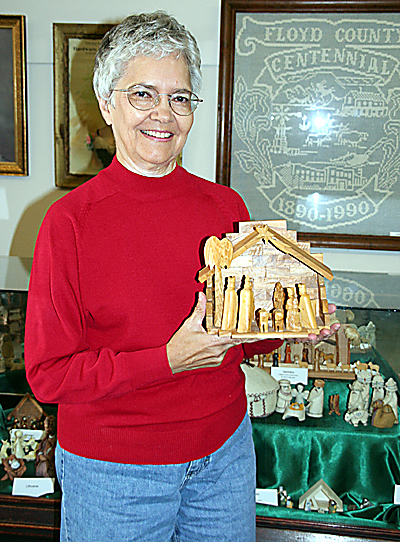
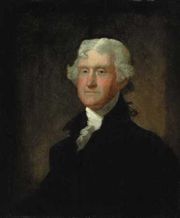
 In my
In my 
 Aaljte Zwier (left) was born in
Aaljte Zwier (left) was born in